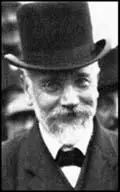Eleftherious Venizelos

Eleftherios Venizelos was born in Chania, Crete in 1864. After studying law in Athens Venizelos became leader of the Liberal Party in Crete. In 1896 he took a prominent role in the Cretan rising against Turkish rule. In 1905 Venizelos becoming the island's first independent prime minister.
In 1910 Venizelos became prime minister of Greece and supported the Balkan League against Turkey (1912) and Bulgaria (1913). As a result of these conflicts Greece gained territory from its defeated rivals.
On the outbreak of the First World War Venizelos favoured an alliance with Britain, France and Russia against the Central Powers. Venizelos wanted Greece to give military aid to the Allies during the Dardanelles campaign, and when King Constantine I refused to agree, he resigned from office.
When Venizelos was re-elected after a landslide victory in March 1915, he ordered mobilization of the Greek Army. When Venizelos invited the Allied forces to Salonika he was dismissed by the king. Venizelos returned to Crete where he formed a provisional revolutionary government.
With the support of Allied forces, Venizelos made plans to march on Athens. In June 1917 King Constantine I was deposed and Venizelos was able to regain power without resorting to force.
Venizelos led the Greek war effort until the Armistice in November 1918. At the Versailles Peace Conference, Venizelos won substantial territorial gains from Bulgaria and Turkey.
Despite his achievements Venizelos was defeated in the 1920 General Election. The new pro-royalist government invited King Constantine I back to power.
Venizelos was prime minister again in 1924, 1928-32 and 1933. In 1935 Venizelos came out of retirement to support another revolt in Crete. When this failed Eleftherios Venizelos was forced to flee to France where he died in 1936.
